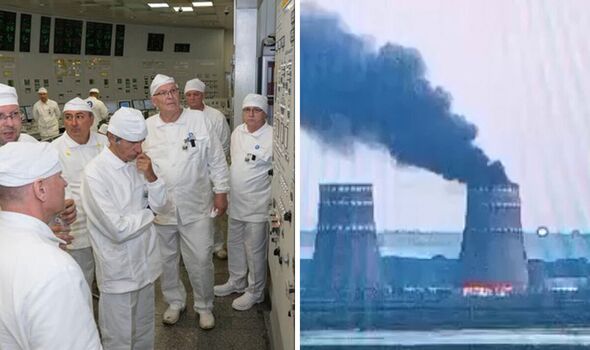Russia’s increasing “weaponisation” of nuclear power plants – most recently Zaporizhzhia in southern Ukraine – has left the world on the brink of an unprecedented disaster, an environmental campaigner has warned.
Jan Haverkamp was speaking during a week in which Raphael Grossi, director-general of the International Atomic Energy Agency (IAEA) visited another nuclear facility in Kursk, Russia, over mounting concerns about safety there.
Mr Grossi previously warned safety at Zaporizhzhia was “deteriorating” after it was hit by a drone, with Ukraine and Russia blaming each other.
Mr Haverkamp, a nuclear expert for Greenpeace and an adviser to Ecoclub, a Ukrainian NGO specialising in environmental issues, told Express.co.uk such fears were entirely justified.
He explained: “The Russian invasion into Ukraine has seen weaponisation of nuclear installations by the Russian side in several instances – Chernobyl, Kharkiv, the South Ukraine nuclear power plant and of course in the ongoing occupation of the Zaporizhzhia nuclear power plant.
“On top of that, the constant Russian attacks on the civilian energy infrastructure do not only pose a violation of the Geneva Convention and humanitarian law because of their disproportional effects on the civil population, they also have increased risks for station black-out for all Ukrainian nuclear power stations.”
As a result, any war situation in regions that hosted nuclear installations increases the risks for nuclear incidents, as Mr Grossi stated during his visit to the Kursk nuclear power plant, Mr Haverkamp pointed out.
He stressed: “The systematic disregard by the Russian military towards nuclear risks and the involvement by the Russian nuclear giant Rosatom and Russian nuclear authorities is creating an unprecedented dangerous situation for an unprecedentedly long time.
“This is one of the reasons that the international community should break all its ties with the Russian nuclear industry, which has been complicit since the start of the Russian invasion into Ukraine.”
An Ecoclub analysis published yesterday to coincide with Mr Grossi’s visit stated: “Zaporizhzhia is Europe’s largest nuclear plant and one of the 10 biggest globally.
“Still containing significant amounts of radioactive material, it sits near the front lines of an active war and has been continually caught in crossfire and possibly a form of nuclear brinkmanship or blackmail.”
The report added: “This is the first war to be fought amid the facilities of a major nuclear power programme, the UN says, though other nuclear facilities have been caught up in earlier conflicts.
“Nuclear safety at Zaporizhzhia is described as ‘fragile and dangerous’ with the IAEA repeatedly warning that explosions at or near the site are a threat to nuclear safety.”
Russian forces are widely believed to have attacked the plant on March 4, less than a fortnight after Vladimir Putin’s invasion of Ukraine.
At the time, Ukrainian President Volodymyr Zelensky said: “We survived a night that could have stopped the story, the history of Ukraine, the history of Europe.”
Posting on X yesterday, Mr Grossi avoided attributing blame but said: “I Was at Kursk NPP today, where the situation is serious.
“Preventing a nuclear accident in this terrible war is vital and attacking any NPP is unacceptable, no matter the location.
“@IAEAorg will continue to promote nuclear safety and security everywhere.”
